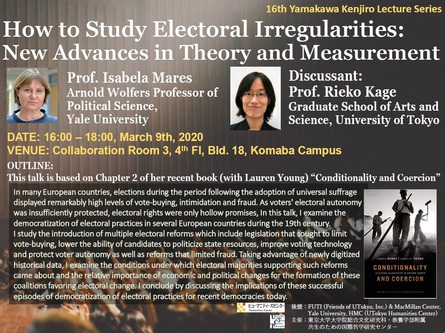|
|
Title: | [キャンセル]Yale大学Isabela Mares教授講演:How to Study Electoral Irregularities終了しました |
||
|---|---|---|---|---|
| Date: | 2020年3月9日(月)16:00-18:00 |
Place: | 東京大学駒場Ⅰキャンパス18号館4階コラボレーションルーム3 |
|
16th Yamakawa Kenjiro Lecture Series
講演者:Isabela Mares教授(Arnold Wolfers Professor of Political Science, Yale University)
日時: 2020年3月9日(月)16:00-18:00
場所:東京大学駒場キャンパス18号館4階コラボレーションルーム3
使用言語:英語
1.題目:How to Study Electoral Irregularities: New Advances in Theory and Measurement
Outline:
In many European countries, elections during the period following the adoption of universal suffrage displayed remarkably high levels of vote-buying, intimidation, and fraud. As voters' electoral autonomy was insufficiently protected, electoral rights were only hollow promises, In this talk, I examine the democratization of electoral practices in several European countries during the 19th century. I study the introduction of multiple electoral reforms which include legislation that sought to limit vote-buying, lower the ability of candidates to politicize state resources, improve voting technology and protect voter autonomy as well as reforms that limited fraud. Taking advantage of newly digitized historical data, I examine the conditions under which electoral majorities supporting such reforms came about and the relative importance of economic and political changes for the formation of these coalitions favoring electoral change. I conclude by discussing the implications of these successful episodes of democratization of electoral practices for recent democracies today.
This talk is based on Chapter 2 of her recent book (with Lauren Young) Conditionality and Coercion
Supported by: FUTI (Friends of UTokyo Inc.), MacMillan Center, Yale University, HMC (The University of Tokyo, Humanities Center)
Organized by: UTCP
2. Second Talk is going to be in Hongo campus:
"Democratization after Democratization: How European countries ended electoral corruption"
DATE: March 10th (Tue): 17:30 to 19:30
VENUE: Conference Room 1, ISS Building, University of Tokyo, Hongo Campus
OUTLINE: In elections around the world, large numbers of voters are influenced by promises or threats that are contingent on how they vote. Recently, the political science literature has made considerable progress in disaggregating electoral clientelism along two dimensions: first, in recognizing the diversity of actors mediating between candidates and voters and, second, in conceptualizing and disaggregating clientelism based on positive and negative inducements of different forms. In this talk, I report the results of several studies I conducted that use non-obtrusive survey techniques, such as list-experiments, to measure the presence of clientelistic strategies. I also show how a variety of other survey experiments can be used to measure voters' evaluation of candidates that use various forms of clientelism and help us understand why voters do not always sanction candidates that use illicit strategies.







